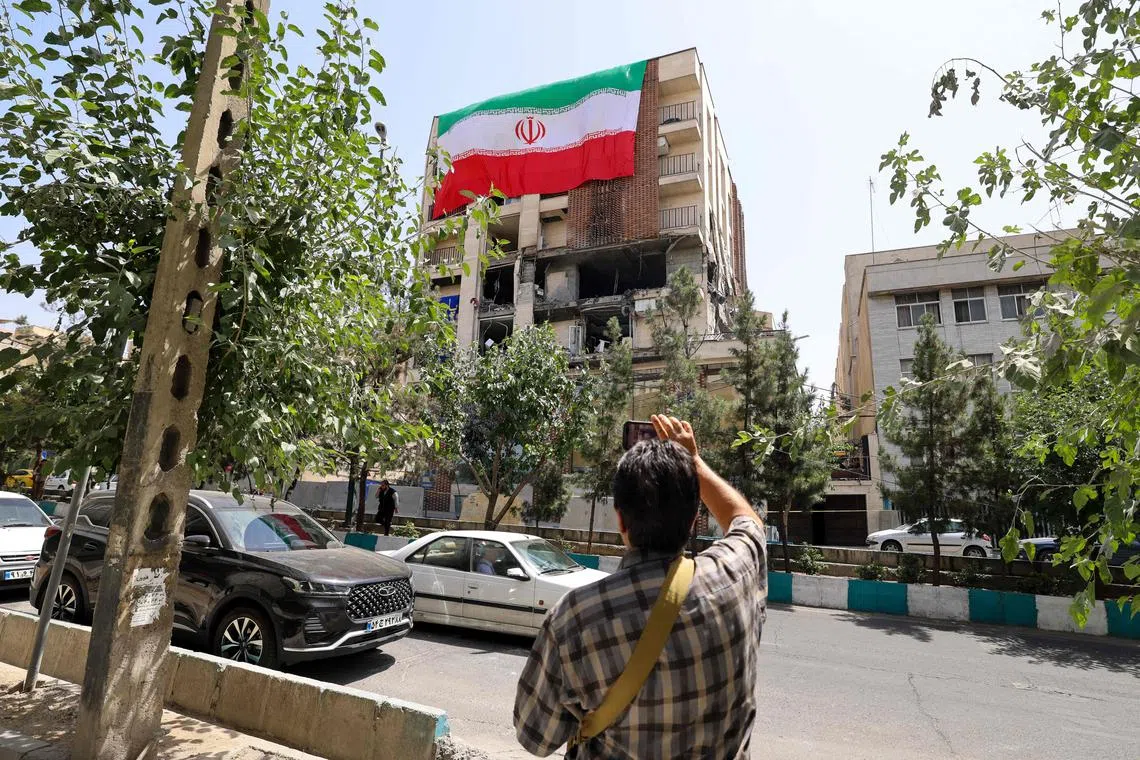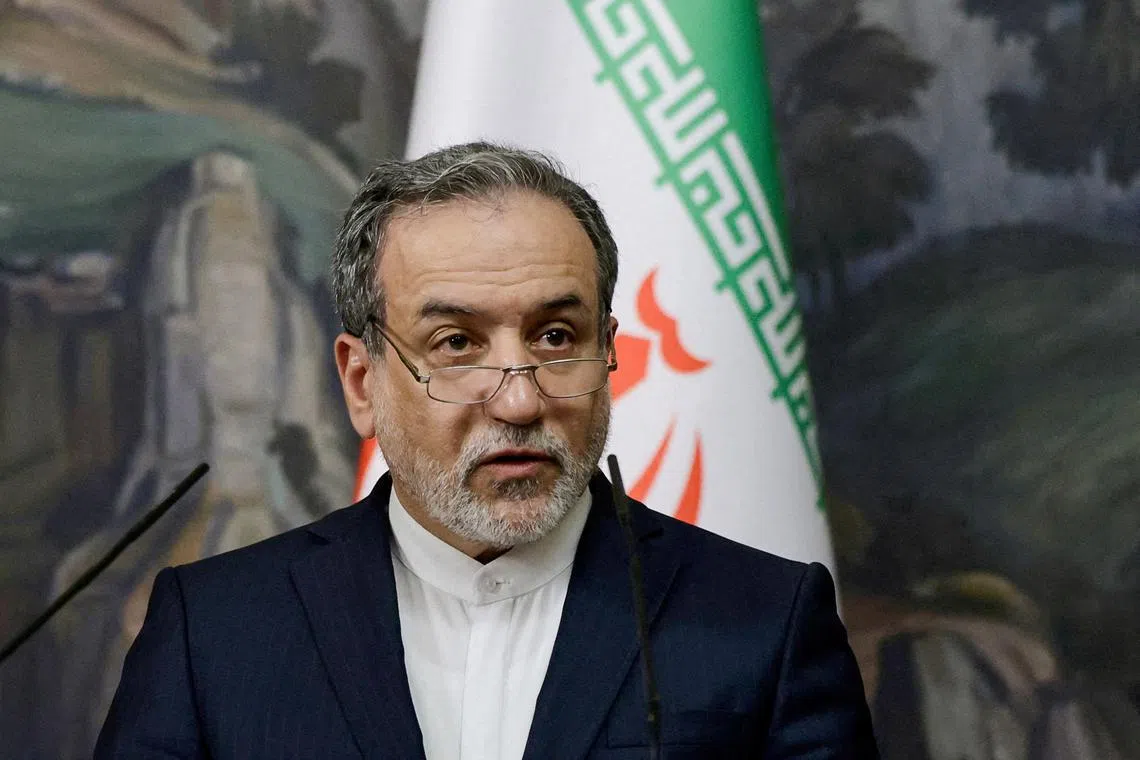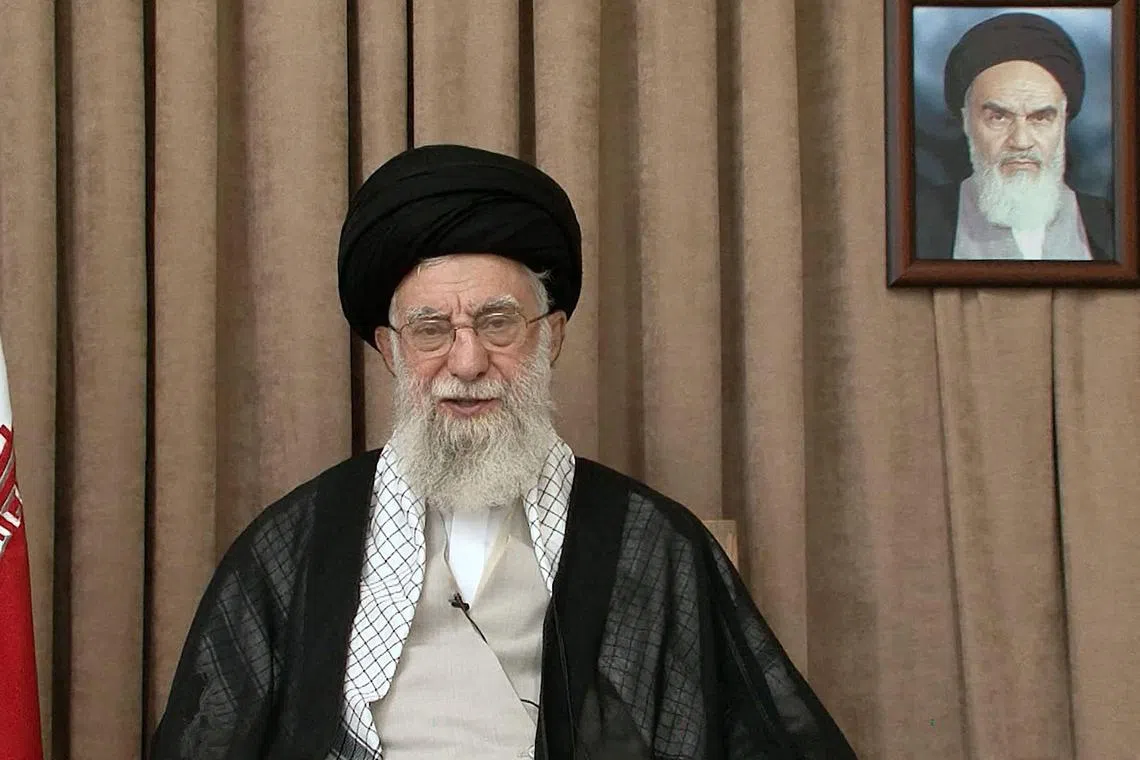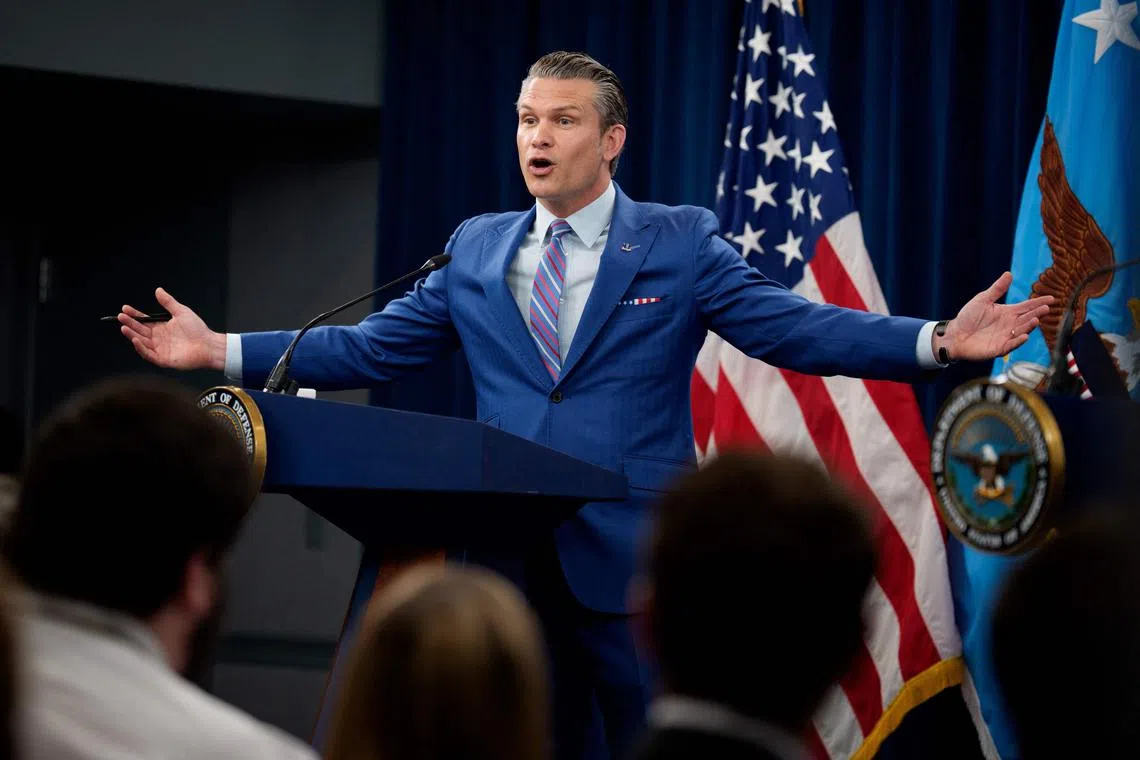Iran says no plan for new US nuclear talks, plays down impact of strikes
Sign up now: Get ST's newsletters delivered to your inbox

A man taking a photo of a residential building in Tehran that was hit by an Israeli missile, with the damaged part covered by a large Iranian flag, on June 25.
PHOTO: AFP
- Iran denied upcoming nuclear talks with the US, following conflict with Israel. Foreign Minister Araghchi dismissed such speculation on state television.
- Ayatollah Khamenei hailed Iran's "victory" and accused Trump of exaggeration, despite damage to nuclear facilities.
- US and Israeli officials assert severe damage to Iran's nuclear programme, while some reports suggest a shorter delay and potential hidden materials.
AI generated
DUBAI - Iran on June 26 denied it is set to resume nuclear talks with the United States after the end of a 12-day war with Israel, and accused Washington of exaggerating the impact of US strikes.
The most serious conflict yet between Israel and Iran derailed nuclear talks between Iran and the United States, yet President Donald Trump said Washington would hold discussions
But Iran’s Foreign Minister Abbas Araghchi shut down what he said was “speculation” that Tehran would come to the table and said it “should not be taken seriously”.
“I would like to state clearly that no agreement, arrangement or conversation has been made to start new negotiations,” he said on state television.
“No plan has been set yet to start negotiations.”

Iranian Foreign Minister Abbas Araqchi said Tehran is assessing whether talks with the US are in its interest.
PHOTO: REUTERS
Mr Araghchi’s denial came as Iranian lawmakers passed a “binding” Bill suspending cooperation with the UN nuclear watchdog and after supreme leader Ayatollah Ali Khamenei accused Mr Trump of exaggerating the impact of US strikes
In a televised speech – his first appearance
“The American president exaggerated events in unusual ways, and it turned out that he needed this exaggeration,” Ayatollah Khamenei said, rejecting US claims Iran’s nuclear programme had been set back by decades.
The strikes, he insisted, had done “nothing significant” to Iran’s nuclear infrastructure.
Mr Araghchi, for his part, called the damage “serious” and said a detailed assessment was under way.
Mr Trump said key facilities, including the underground Fordow uranium enrichment site, had been “obliterated” by American B-2 bombers.
Posting on his Truth Social platform, he dismissed speculation Iran might have removed enriched uranium prior to the raid, saying: “Nothing was taken out... too dangerous, and very heavy and hard to move!”
He added that satellite images showed trucks at the site only because Iranian crews were attempting to shield the facility with concrete.
Ayatollah Khamenei dismissed such claims, saying “the Islamic republic won, and in retaliation dealt a severe slap to the face of America”.
Both sides have claimed victory: Israeli Prime Minister Benjamin Netanyahu called it a “historic win”, while Ayatollah Khamenei said Iran’s missile retaliation had brought Israel to the brink of collapse.

Iran’s supreme leader, Ayatollah Ali Khamenei, made his first appearance since a ceasefire in the war with Israel, with a televised address.
PHOTO: AFP
US defence
In Washington, the true impact of the strikes has sparked sharp political and intelligence debates.
A leaked classified assessment suggested the damage to Iran’s nuclear programme may be less severe than initially claimed – possibly delaying progress by only a few months.
That contrasts with statements from senior US officials.
CIA director John Ratcliffe said several facilities would need to be “rebuilt over the course of years”.
Pentagon chief Pete Hegseth accused the media of misrepresenting the operation.
He said the United States used massive GBU-57 bunker-buster bombs on Fordow and another underground site, while submarine-launched Tomahawk missiles targeted a third facility.
“President Trump created the conditions to end the war, decimating – choose your word – obliterating, destroying Iran’s nuclear capabilities,” Mr Hegseth said.

US Defence Secretary Pete Hegseth speaking during a news conference at the Pentagon on June 26.
PHOTO: AFP
Doubts remain about whether Iran quietly removed some 400 kilogrammes of enriched uranium from its most sensitive sites before the strikes – potentially hiding nuclear material elsewhere in the country.
Netanyahu says Iran ‘thwarted’
Following waves of Israeli attacks on nuclear and military sites and retaliatory missile fire from Iran since mid-June – the deadliest between the two countries to date – the US bombed three key Iranian atomic facilities.
Initial intelligence reports, first revealed by CNN, suggested the strikes did not destroy critical components and delayed Iran’s nuclear programme only by months.
Experts questioned if Iran had pre-emptively moved enriched uranium to protect it. The US administration has forcefully rejected such suggestions.
The Israeli military said Iran’s nuclear sites had taken a “significant” blow, but cautioned it was “still early” to fully assess the damage.
Mr Netanyahu said Israel had “thwarted Iran’s nuclear project”, warning any attempt by Iran to rebuild it would be met with the same determination and intensity.
Iran has consistently denied seeking a nuclear weapon while defending its “legitimate rights” to the peaceful use of atomic energy.
It has also said it is willing to return to nuclear negotiations with Washington.
The Israeli strikes on Iran killed at least 627 civilians, Tehran’s health ministry said.
Iran’s attacks on Israel killed 28 people, according to Israeli figures. AFP


